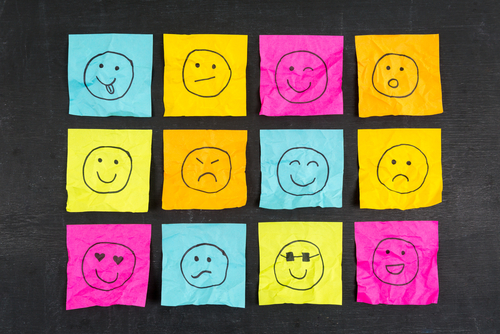Can you cut 1 Tonne of carbon pollution out of your life?
Take the challengeClimate change and its associated environmental, social and sustainability problems are part of the daily news cycle. It is now regarded as the greatest threat to humanity.
So, the facts and figures are clear, but what about the feelings?
As our knowledge and awareness of these issues increases, strong emotional reactions are common, and completely rational. It makes sense that intense emotions surface when we see images of environmental and social threats, and think about the uncertain future that our children will live in.
“What do I feel about climate change? Interest, intellectual curiosity, satisfaction, excitement, extreme worry, sadness, fear and perhaps a glimmer of hope...”- Dr Ruth Mottram, Danish Meteorological Institute
"It makes me feel sick. Looking at my children and realising that they won't have the same quality of life we had. Far from it. That they will live in a world facing severe water and food shortages, a world marked by wars caused by the consequences of climate change." - Katrin Meissner, Associate Professor, Climate Change Research Centre, University of New South Wales.
Emotions are complicated - especially when reacting to an issue as important and complex as climate change. It's an emotional rollercoaster with highs and lows, and sometimes you might want to get off. But this is a ride that lasts a lifetime.
Yes, the threats posed by climate change are real and can be frightening. But people generally cope better, and can make change more effectively, when we are calm and rational.
Looking at some of the common emotions associated with climate change can help us understand why we feel this way and what we can do about managing these emotions to feel safer, and even have some fun along the way.
I'm scared and I want to get off: Common reactions to climate change
A recent study by Yale University identified a range of common emotional reactions that people have in relation to climate change. When faced with environmental threats and catastrophic predictions for the future, people commonly feel anxious, scared, depressed, helpless, frustrated, guilty or angry.
Sometimes, if the information is too confronting and the solutions seem too challenging, people might feel denial about whether there is a problem, or use this as a way to avoid thinking about the problems.
Another common feeling is apathy. Climate change problems are not easily fixed and seem to continue on with no resolution. This increases the chances of tuning out as a way to minimise our stress and justify continuing with business as usual.
There are now even terms for such psychological and emotional responses to climate change: "Climate Depression," "Pre-traumatic Stress Disorder," "Solastalgia" and "Ecological Anxiety Disorder," just to name a few.
The problem with these negative feelings is that they can become paralysing, and the enemy of action. Remaining in a state of heightened distress or switching off is not helpful for our emotional wellbeing or for working towards climate change solutions.

[Image: Shutterstock] The emotions of living in a changing climate: more emojis than Julie Bishop's iPhone.
Buckle up and enjoy the ride: Managing the emotions of climate change
Managing our emotions is not about control or suppression, but rather how to ride the rollercoaster in a calmer and more rational way that allows us to focus on climate change solutions, and take personal action. There are a number of strategies that we can call on to achieve this, and also discover the positive side to understanding and acting on climate change.
Coping with negative emotion and distress first requires acknowledging and accepting these feelings as being perfectly reasonable and rational. Research studies support that emotions like fear, helplessness and apathy are very common regardless of gender, race and religion, and even amongst scientists who study climate change.
Once we are comfortable with negative feelings being part of understanding climate change, we can expand our focus to include more positive emotions. Being hopeful and optimistic about a sustainable future with a safe climate is empowering, and helps us to feel that we are not alone. There are millions around the world who share these concerns (as well as 1 million women!), and a growing movement of grass roots and government led initiatives to reduce carbon emissions and adopt sustainable living practices. Participating in such activities creates space to witness and contribute towards positive impact and progress towards a safer climate, and strong sense of hope for the future.
We can also embrace the power of the individual, the power of you! Going green doesn't have to be a daunting task that means sweeping life changes or giving up the things you love. Simple choices and actions every day do have an impact. Everyday actions towards more sustainable ways of living can be a source of pride and even joy, in, for example, cultivating the simplest veggie patch.
While it is completely normal to feel a shifting combination of these emotions in response to our changing climate, being aware of the twists and turns and how to feel safe along the way will help us find joy and peace on the ride of life.

[Image: Shutterstock]
Jessica Blomfield is a researcher, educator and facilitator in sustainability. She is completing a PhD at Griffith University, which focuses on how sustainability professionals experience emotion and regulate emotion in their work to influence positive environmental change in corporate organisations. She also has a Master of Environment in Sustainability Education.
Jessica has recently launched The Green House: education, inspiration and a community for healthy, eco, ethical living. Find out more on the website, Facebook and Instagram.[Banner Image: Unsplash]
WATCH THIS NEXT: Do you want some good news? We've got plenty!
